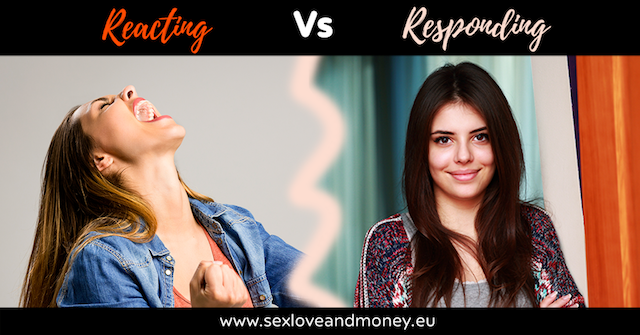Reacting vs Responding
The other day my colleague Vincent Clohessy and I showed in a role play on a Facebook live, how communication can fall into blaming, shaming, avoiding responsibility, defending yourself, being abusive.
I started the conversation out of anger, telling Vincent what he did wrong. He got triggered, started to defend himself and to remember all the things he could blame me for, so he could take my anger to throw it right back on me. This went back and forth until he finally left.
Does that sound in any way familiar to you? 😉
Before I learned some very simple communication tools I had those conversations and arguments quite often.
What really happened
What happened in our scene was an instinctive reaction that usually happens when we go into anger. We get easily overwhelmed with this feeling. There is no self-direction, no creation. There is only one thing: I want to make you stop attacking me and I probably make you feel guilty.
When we choose to respond, we are more powerful, because we can direct were we are going. When we are in anger, we are just like a puppet on a string.
So, in the second part of the role play we chose to play the same scene in a more fun way.
This time Vincent reported, he didn’t have to bunk off, he was open and available to me and we stayed in connection.
To watch the video, click here
If you get the sense of getting into conflict with somebody, whatever you are feeling and responding is about you. It’s not about the other person. Anything the other person does, is neutral. Imagine, 2 people are observing this person. One is reacting with anger, the other one with laughter. That shows, that not this person is the cause, it’s me.
Instead of trying to fix the other person, which is not possible anyways, ask yourself: Why am I not in love and acceptance of everything that this person does?
You have the choice to react, which means going into automatic mode of replaying your old patterns, or, you can take the responsive way and be generous, patient, kind and listen, offering love and acceptance.
If you take the first option, it usually ends up in pain for both partners >> LOOSE-LOOSE.
If you choose to respond from a place of generosity and kindness, at the end of the communication, both end up feeling loved and good. From there you can create positive things. If the connection breaks, also trust breaks. >> WIN-WIN
You can always choose if you want to feel attacked and blamed or if you rather respond meeting the other person with curiosity and find out what this all is about.
A man’s perspective
Vincent shared very interesting information we women should know about men and women’s anger:
„It’s very confusing. With a man, I can understand the escalation in conflict. The ultimate outcome is that we fight. I can figure out where this is going to go and what the rules are and the consequences. I could get my ass kicked, I got that and I am comfortable with it.
But when it comes to women, we don’t hit women. So, when things start to escalate it gets weird because it goes beyond reason and argument into something more tense. A good man will walk away. He’ll just leave because he doesn’t know where it goes from here. I have to exit and take this anger, to keep it safe.
With a man, I can push it, he pushes me back, we can go toe to toe. With a woman, you can’t. And so, when it boils up, a man should leave. Of course, this drives women crazy because they want to dive deep into it and get the problem resolved. For the men it can be too much.“
Humor helps, and an open heart to dissolve the anger in seconds.
Reaction is dense and has a lot of pain in it. Response is light, fluid and joyful and has an expansive nature to it, so we can connect.
And being connected we can evolve.
If you don’t want to miss helpful information about relationship, register for my newsletter.
Greetings,
Klana
